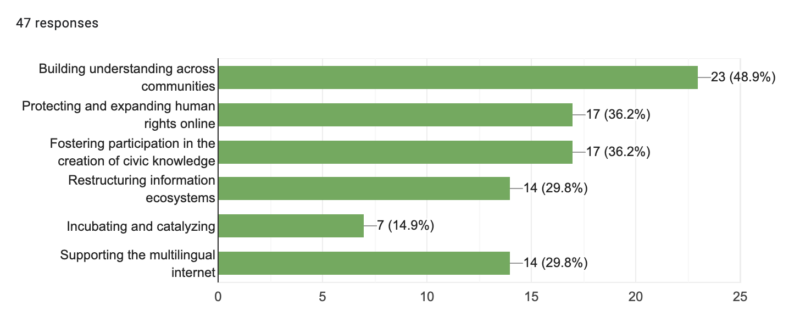
Which of these models do you consider to be most important for Global Voices’ mission. Select two.
The 2021 Community Council focused on Global Voices @ 20 [1], discussing our goals and mission statement in preparation for a strategy to take us to our 20th anniversary, in 2024.
To that end, we examined six different models for a mission statement:
- Building understanding across communities
- Protecting and expanding human rights online
- Fostering participation in the creation of civic knowledge
- Restructuring information ecosystems
- Incubating and catalyzing
- Supporting the multilingual internet
These models are explored in detail in an Issue Paper [2]. After discussing the paper in a series of calls, we conducted a poll of the Council to understand preferences and perspectives. Please refer to the full results of the poll in this post [3] by Jer Clarke in order to better understand the following analysis of results.
For the poll, we asked eight substantive questions. We received 48 responses, which is more than 50% of the Council, which has 78 members. That’s as good if not better a turnout of polls than previous Councils.
Interestingly, preferences among the poll takers was clear. We saw very strong support for Building Understanding Across Communities [4], with nearly 49% choosing it as one of their top two, and nearly 30% choosing it as their top choice. In both cases, it beat the number two choice by over 12% points.
The #2 choice was Protecting and expanding human rights online [5], at 36% and 17% respectively, but it was actually tied with or only marginally ahead of several other choices.
Incubating and Catalyzing [6], the least preferred choice, showed a significant drop support for the question “Which of these models do you consider to be most important for Global Voices’ mission. Select two,” garnering only 15%, which was 15% points behind the next choices. However, while it was also the least preferred in the question “If you had to choose only one model, which would it be?”, it was statistically even with five other choices. It also received some impassioned support in the comments section. Its boosters argued that it offered an important new direction for us to consider. Unfortunately for those boosters, it also won the “least important” question, with 45% saying it was the least important, 8% points above the 2nd place option.
Fostering participation [7], Protecting and expanding human rights online [5], and Restructuring information ecosystems [8] all fell into the middle of responses. Each had strong proponents in the comments, and of these only Restructuring suffered in the “least important” question, coming in 2nd by a statistically relevant margin. While its boosters made strong arguments to support it, it may have also seemed too complex as a public-facing statement.
Supporting the Multilingual Internet [9] also fell into the middle of the “top-two” and “top-one” questions, but had the curious distinction of being, by a large margin, of being last in the “least important” question, with only 4.5% (two people!) choosing it. This could be read to mean that it is recognized as nearly universally important among the respondents, but not important enough to win the popularity contest questions.
Other Observations
For the question: “There are many issues that drive conflict and misunderstanding between countries and peoples…Which do you think are most important for Global Voices to address?” Sixty-five percent said that we are well positioned to respond to lack of context and provide analysis, while nearly 59 percent said we can respond to state-driven propaganda and disinformation.
For the question: “In spite of increased access to the tools of expression, there remains a serious imbalance in who receives attention in the media…Which of the following approaches do you think are most important for Global Voices to pursue to address this imbalance?” Fifty-four percent said we should focus on exchanges of knowledge and information grounded in local and personal experience.
For the question, “What changes would you most like to see in the world as a result of Global Voices’s work?”, “Access to contextual information that helps audiences understand complex issues” received 52 percent, while “Underrepresented communities create information and knowledge that positively influences civic life” received 45 percent.
Numerous commenters saw their choice as an overarching frame in which the others could fit – especially for Building understanding, Fostering participation, and Protecting human rights.
Building understanding was seen by many as the most straightforward and realistic, and focused on the individual, and at the core of what we do. Understanding is seen by some as an important step toward the path of civic participation, even if the latter is a more ambitious goal.
Incubating and catalyzing and Building the multilingual internet were seen as important activities where we already have strong skills.
Restructuring information ecosystems was seen as something few others do, and nicely aligned with our work, and has the potential to open us to new partners.
Conclusions
We see strong support for a mission that focuses on building understanding across communities, in which underrepresented groups provide more contextual information that helps audiences understand complex issues, and counters state-driven propaganda, narratives and disinformation.